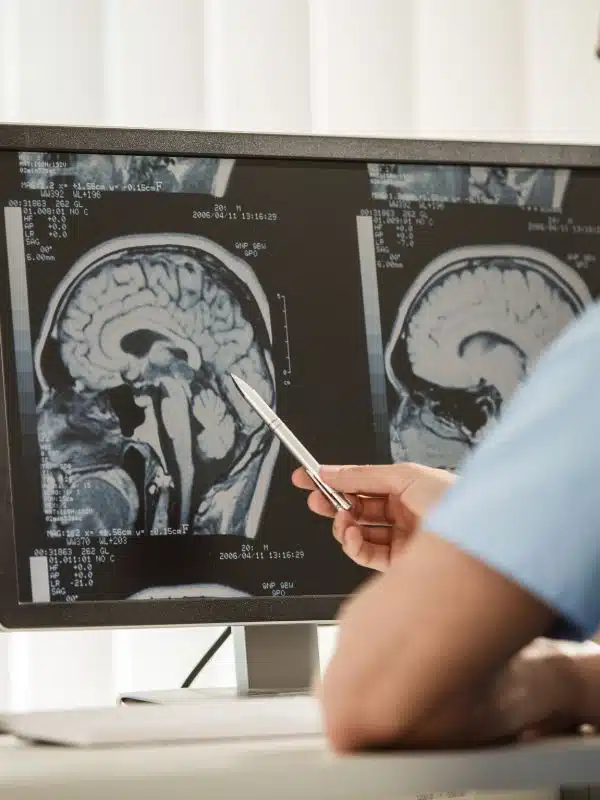5101 Medical Dr. San Antonio, Tx. 78229
Research has shown a strong connection between hearing loss and cognitive decline, emphasizing the importance of early intervention. Studies suggest that individuals with even mild or moderate hearing loss are at a higher risk of experiencing cognitive decline compared to those with normal hearing.
Several factors contribute to this link:
Addressing hearing loss early is essential for preserving cognitive health as we age. At Precision Hearing Care, our board-certified audiologists provide comprehensive hearing assessments and personalized solutions to help protect both your hearing and brain function. By managing hearing loss effectively, we can help you stay engaged, maintain mental sharpness, and improve your overall quality of life. Schedule a consultation today to take a proactive step toward better hearing and cognitive well-being.


Extensive research has highlighted the strong connection between hearing loss and cognitive decline, but promising evidence suggests that using hearing aids can help improve cognitive function in individuals with hearing impairment.
A study published in the Journal of Gerontology found that older adults with hearing loss who used hearing aids performed better in key areas of brain function—memory, executive function, and processing speed—compared to non-users. Similarly, research in Frontiers in Aging Neuroscience revealed that individuals with mild to moderate age-related hearing loss who consistently wore hearing aids for six months showed significant improvements in working memory and executive function.
These findings emphasize the potential of hearing aids to support brain health by reducing cognitive strain, improving information processing, and enhancing communication. Hearing loss can make it more difficult to follow conversations, leading to social withdrawal, loneliness, and an increased risk of depression and anxiety—all of which are linked to cognitive decline.
While further research is ongoing, it’s clear that early intervention is key. At Precision Hearing Care, we encourage regular hearing assessments to monitor hearing health and address concerns before they impact your cognitive well-being. If you or a loved one are experiencing signs of hearing loss, schedule an appointment today to explore how hearing aids can help you stay sharp, socially engaged, and mentally strong.
Social isolation occurs when an individual has limited interaction or contact with others, often leading to feelings of loneliness, disconnection, and a lack of support. This can result from physical barriers, such as living alone or mobility challenges, as well as psychological factors, including depression or anxiety that make social engagement difficult. Prolonged social isolation can have serious effects on mental and emotional well-being, increasing stress, lowering self-esteem, and heightening the risk of mental health concerns. Addressing social isolation is essential for overall health and quality of life, and it starts with fostering meaningful social connections and strong support networks. Prioritizing community engagement, communication, and emotional well-being can help combat isolation and promote a healthier, more fulfilling life.
Dementia is a broad term that describes a decline in cognitive functions such as memory, reasoning, and problem-solving, which can interfere with daily life. Rather than being a single disease, dementia refers to a set of symptoms caused by various brain conditions. Common signs of dementia include memory loss, confusion, difficulty with communication, disorientation, mood changes, and challenges in completing everyday tasks. The severity and progression of symptoms vary based on the underlying cause. Alzheimer’s disease, vascular dementia, and frontotemporal dementia are among the most common causes, each affecting the brain in different ways. While there is no cure for most forms of dementia, early diagnosis and proper management can help improve quality of life and slow symptom progression. Understanding the signs and causes of dementia is essential for seeking timely support and care.
Alzheimer’s disease is a progressive brain disorder that affects memory, thinking, and behavior, making it the most common cause of dementia. Over time, it leads to increasing difficulties with daily tasks, confusion, personality changes, and a loss of independence. While the exact cause of Alzheimer’s is not fully understood, it is linked to abnormal protein deposits in the brain that disrupt communication between brain cells, eventually causing their deterioration and death. As the disease advances, individuals may experience severe memory loss, difficulty recognizing loved ones, and challenges in performing basic activities. Although there is currently no cure, early detection and treatment can help manage symptoms, improve quality of life, and slow disease progression. Understanding Alzheimer’s is key to providing the right support and care for those affected.